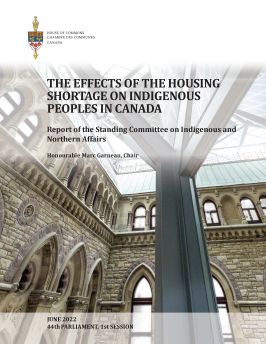The effects of the housing shortage on Indigenous Peoples in Canada
Cette ressource est également disponible en français.
Safe, adequate and affordable housing is a human right and a core social determinant of health for Indigenous Peoples in Canada, but intersecting structural forces such as colonialism, racism and power imbalances create persistent barriers. Unsafe, inadequate and unaffordable housing has a disproportionately negative effect on Indigenous people and communities, with policy implications at all levels, especially for the federal government, public health and community organizations.
Recognizing the severe harm caused by the ongoing housing crisis, the House of Commons Standing Committee on Indigenous and Northern Affairs undertook a study — drawing on Indigenous witnesses directly affected by the housing shortage and expert testimony — to explore the impacts on Indigenous Peoples and identify policy and legislative solutions.
The housing crisis is a complex and multifaceted issue that directly impacts Indigenous health outcomes
Numerous aspects of the housing crisis intersect to impact physical, mental and social health outcomes for Indigenous Peoples. In addition to lack of available housing and unaffordable costs, other critical factors pose direct threats to both physical and emotional health. These include overcrowding, unsafe conditions, contamination, pests, mould and deteriorating conditions. The intersection of the housing crisis with other systemic barriers, including education, employment, family and gendered violence, and dispossession and dislocation from traditional lands, further exacerbates the ongoing harms of colonialism.
Recommendations to inform public health action
The report outlines 20 recommendations for consideration that can also guide public health efforts and support. Key areas of action include co-development of housing solutions with Indigenous Peoples, leadership by Indigenous governments and organizations, sustainable funding for improving housing conditions and supply, and removing restrictions on traditional land use. Further, it recommends aligning actions with the Truth and Reconciliation Commission’s Calls to Action, particularly those focused on “Reclaiming Power and Place” and on the distinct experiences of Indigenous women, girls and gender-diverse people.
Use this resource to
- Facilitate discussion about the critical importance of safe, adequate and affordable housing for Indigenous communities
- Use the evidence and recommendations to guide public health practice and policy action
- Support advocacy across all levels and sectors to improve Indigenous housing conditions, affordability and availability across Canada
Alignment with NCCDH work
The NCCDH has published a number of resources to support housing as a public health focus, including curated lists of resources to guide public health action in this area.
Housing as a focus for public health action on equity: A curated list
Public health action to address tuberculosis in homeless shelter settings: A curated list
NCCDH has an ongoing collaboration with RentSafe which resulted in resources that summarize housing as a public health issue in Canada and highlight participatory practice and direct engagement of people with grounded expertise to offer practical and tangible areas of action for public health at all levels.
Towards healthy homes for all: What the RentSafe findings mean for public health in Canada
Other relevant learnings come from COVID-19 efforts to support underhoused populations and those experiencing homelessness or precarious housing.
See more resources on housing as a determinant of health.
Reference
Standing Committee on Indigenous and Northern Affairs. (2022). The effects of the housing shortage on Indigenous Peoples in Canada. Canada, Parliament, House of Commons. https://www.ourcommons.ca/Content/Committee/441/INAN/Reports/RP11862143/inanrp03/inanrp03-e.pdf
Tags: Housing, Indigenous health, Government, Document, Report / Document
